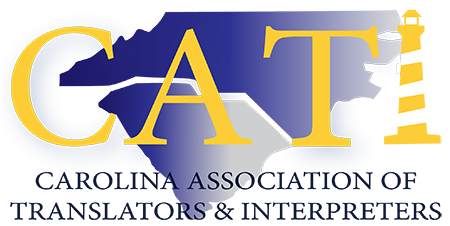By M. Eta Trabing

M. Eta Trabling
“I’m bilingual, and I think I’d like to be a translator or interpreter. What else do I need to consider?”
So glad you asked! It means you know that having two languages does not make you a translator or interpreter any more than having two hands makes you a pianist. In both cases it takes a lot of study and practice. But let’s back up to more basic questions: What does the work actually involve? Do I have the personality type and the aptitudes and interests I’ll need for success in this field?
For translation you must know the target language (the one you will be translating into) in great depth, and your grammar, spelling, capitalization, and punctuation should be nearly perfect. You must love words and be detail-oriented, for you will often have to research a word or phrase diligently — in books or dictionaries, on the Internet, with friends, wherever — until you find just the right translation for the context.
As a translator, you must also have practical and theoretical experience and knowledge in the fields you choose to work in before you can turn out a good translation, and you must be familiar with business and technical terminology. Of course you will need specialized monolingual and bilingual dictionaries in your chosen fields. If you will be self-employed, you will need to invest in computer hardware and software and to spend time learning to use it efficiently. You may eventually want to invest in terminology-management software and other translation aids.
For interpretation you must know both the target language and the source language (the one you will be interpreting from) very well indeed. It is one thing to speak a language fluently when you get to choose the words you want to use; it is an entirely different matter to speak it well enough to use the exact grammar, syntax and words that someone else chooses, and to convey the exact message and tone expressed by the speaker, without error. The speaker could be someone with a very limited vocabulary or someone very erudite. You have to be able to work with both and change your register accordingly.
As an interpreter, your brain must function quickly and accurately, and your personality should reflect your enthusiasm for the work you do. Although you won’t need the written skills as much as in translation, if you write correctly you will speak correctly, and you certainly need to be able to read correctly in both languages. Your knowledge of terminology must be immediately available in your mind, because you only have a split second in which to come up with the appropriate word; most of the time you will not have time to look up words in a dictionary. It helps if you are the type of person who enjoys being around people and doesn’t get offended if someone corrects your interpretation. You must study constantly, for you never know what someone is going to say. You must also learn consecutive and simultaneous interpretation techniques and how to sight-translate.
Dialects and everyday slang can be quite different from one region to another, not to mention from one country to another, even if the language is the same one. An interpreter needs to know which dialect and register to use when and where. A translator must be able to communicate on the level of the target readership, whether it be school children or university professors, but the translation should faithfully reflect the original.
There are a number of universities and private institutions around the country that offer courses in translation and interpretation. Most people prefer to specialize either in translation (working with the written word) or interpretation (working with the spoken word). Find out which suits your talents and personality best. Translators are usually advised to work only into their native language. But if you moved to another country as a child and were educated there, your native language may no longer be the dominant one; it might even be outdated. Take language and grammar courses in your weaker language to get it up to par with your stronger one. Read newspapers and magazines in both languages. Keep up with changes in usage. Note how new words and phrases are incorporated in general and in your chosen fields.
So what comes next?
Join professional organizations, both national and local. Go to their meetings, read their literature, and find out how business is done in your chosen profession. You can’t expect others to give you free advice on how to set yourself up as their competition, but you can offer to work in exchange for mentoring. Find out what the ethics and standards of conduct are for the translation or interpretation professions, and follow them. Be honorable with your clients and colleagues, and don’t diminish the profession by your actions. Remember, too, that interpreters and translators, like professionals in any other field, can be held legally liable for their work.
As in any business endeavor, certain investments and decisions must be made before you are ready to field that first call from a prospective client. If you want to translate, you will need to invest in computer hardware and software. Even interpreters need some knowledge of computing, for the world revolves around it. Choose the subjects you will specialize in and the language pairs in which you will offer service (e.g., from Spanish to English or from English to Dutch), and purchase relevant dictionaries. Your colleagues in professional organizations will generally be glad to advise you here. Of course you will also need office supplies, business cards, and a professional-looking résumé or promotional brochure.
Prepare a pricing plan for the services you will offer, and make a list of appropriate questions to ask the potential client about the job prior to quoting a price. Determine a reasonable hourly or daily output for your level of experience, and then add a safety factor, to avoid agreeing to a tight deadline you may not be able meet.
You must be familiar with the terminology of any field you work in. Technology, the sciences, and everyday language are constantly changing: New words are coined and new techniques are born. Keep up with the changes in the subject areas of your choice by continually reading up on them and filing away new words, concepts, and ideas. Note how words are used. Some words change their meanings over the years, becoming either more inclusive or more limited, and their usage may depend on the subject area. Many terms once considered technical are now also part of the everyday world, and you need to know how to use them correctly in both contexts.
Go to meetings of associations that cover the subjects you have chosen (e.g. law, medicine, animal husbandry), talk to the people attending them, learn from them, ask if you can use them as a source of [paid] consultation in the future, read their journals, and get to know the “hot” or emerging topics. Take courses in the subjects you have chosen. Read, read, read, so that you will know more and be a better translator or interpreter.
Keep your two languages separate and as pure as possible. In translation, mixing any two languages (“Spanglish,” “Franglais,” etc.) is inappropriate. You can sometimes get away with it in interpretation, but it should really not occur there either. When interpreting, you should be able to deal with difficult language situations in a very calm manner. Your success as a linguist will depend very much on the trust people have in your abilities. If they hear English words mixed in with your foreign language or vice-versa, they will assume that you do not know the equivalents in the other language and therefore cannot be interpreting correctly. If your mouth isn’t moving while people think you are interpreting simultaneously, they will quickly perceive that something is not right. Their trust in you will erode.
In a service business, which this is, especially when you are first starting out, be prepared to work long, hard hours, over weekends and at night, because you will be expected to do the work when the client needs or wants it and not when it is convenient for you. If you don’t, the client may find someone else who is willing.
Be prepared to do a lot of administrative work, such as marketing and sales; invoicing; collection of overdue accounts; completion of local, state, and federal government paperwork; purchasing supplies; paying taxes. Take a course in how to run a small business at your local community college.
Stay healthy and get enough rest, or your work will suffer. If you are tired, stressed out, or feeling unwell, you will have trouble concentrating and producing clear and concise thoughts. Remember to get up and walk around every hour or two, or do isometric exercises. Sitting in front of a computer all day can be very tiring. Interpreting nonstop for more than one or two hours can also be exhausting. In both cases you will make mistakes that you are not even aware of—and that may be hazardous to your client. Take short breaks to clear your mind.
If you should decide that translating and interpreting is not something you want to do professionally, there are many other ways of using your language skills. Depending on your language, you may be able to find bilingual employment. You can also volunteer as a community interpreter, when foreign visitors or immigrants need help. But please, do not volunteer in medical or legal situations, which require a high level of knowledge and practice, and where someone’s life and livelihood may well depend on your interpretation.
All these things are doable and learnable with sufficient dedication, commitment, and effort. If you have chosen translation or interpretation as a career, welcome aboard!
*M. Eta Trabing is a freelance translator and interpreter with over 40 years of experience. She is a certified U.S. Federal Court Interpreter, a state certified court interpreter, and the founding director of the Berkana Center for Translation and Interpretation Studies. She was President of CATI from 1995 to 2000.
